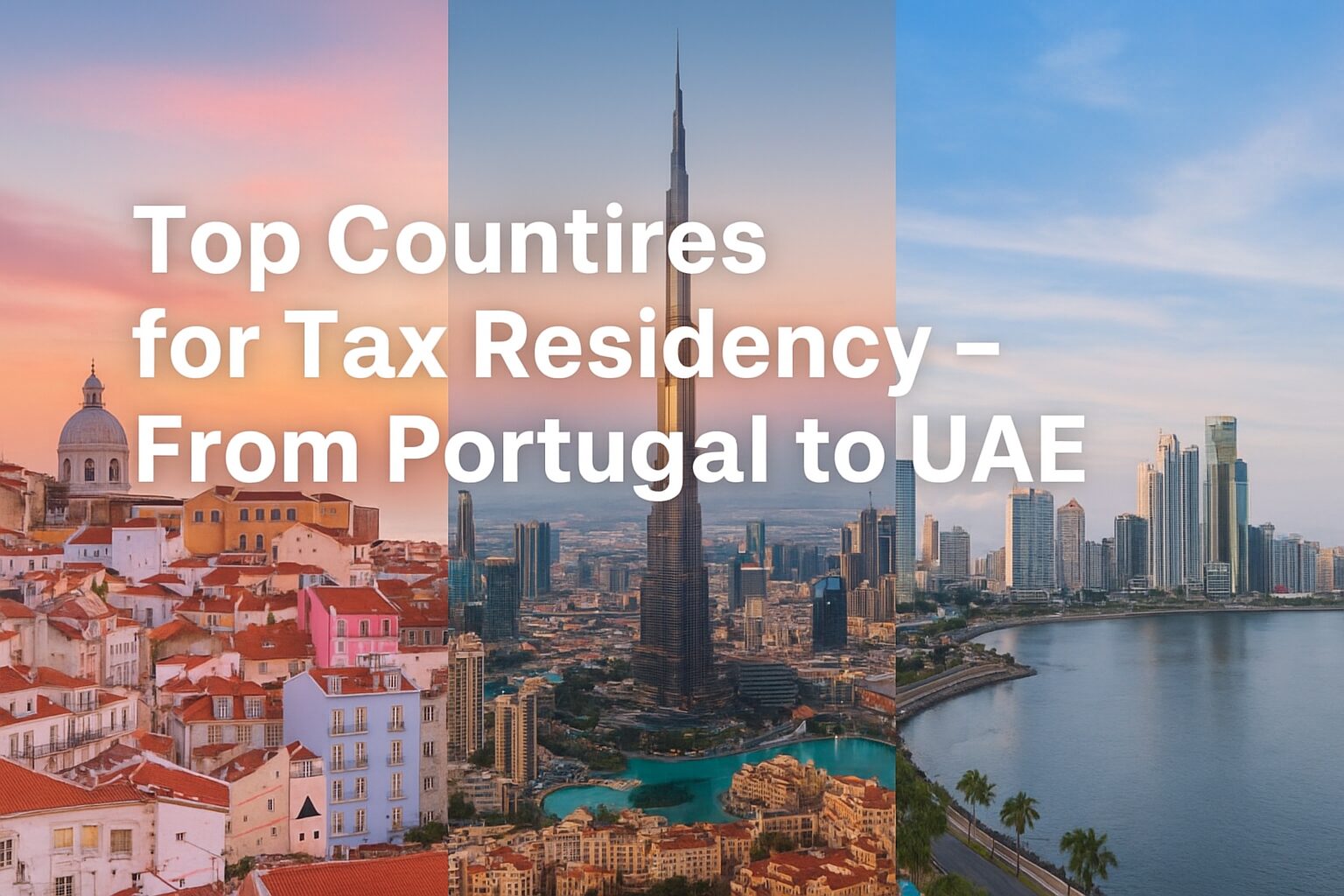The Power of Choosing the Right Tax Residency
In today’s interconnected world, your passport and your tax residency no longer need to align. Ultra-high-net-worth individuals, global entrepreneurs, digital nomads, and even retirees can legally choose where they pay taxes—and the difference in wealth preservation can be enormous.
Selecting the right tax residency country is one of the most effective ways to protect income, grow assets, and secure a tax-efficient lifestyle. While some countries impose high global taxation, others welcome foreign investors with zero or low personal income tax regimes, favorable double tax treaties, and lifestyle advantages.
This guide is the definitive playbook for identifying the top jurisdictions for tax residency. We will explore Portugal, UAE, Monaco, Malta, Panama, and more, breaking down their advantages, requirements, and risks. By the end, you’ll know exactly where to position yourself to maximize wealth and minimize taxes.
1. What Is Tax Residency and Why Does It Matter?
Tax residency determines which country has the legal right to tax your worldwide income. This is not the same as citizenship. For example, you could be an American citizen but establish tax residency in the UAE, where personal income tax is zero.
- Key Factors:
- Number of days spent in a country (often 183+ rule).
- Center of vital interests (family, assets, business).
- Legal agreements (double tax treaties).
- Impact:
- Determines global taxation scope.
- Affects capital gains, inheritance, and wealth tax exposure.
- Directly influences long-term wealth accumulation.
2. Portugal – Europe’s Most Attractive Tax Residency
2.1 The Non-Habitual Resident (NHR) Regime
- Offers a 10-year preferential tax scheme.
- Foreign-source income (pensions, dividends, royalties) often exempt from Portuguese taxation if taxed abroad.
- Flat 20% tax on certain Portuguese-sourced professional income.
2.2 Lifestyle & Benefits
- High quality of life, EU healthcare, affordable living.
- Access to EU financial system.
- Popular with retirees and digital nomads.
2.3 Risks & Changes
- NHR program under EU pressure—recent adjustments reduce benefits.
- Becoming too physically present in Portugal may trigger broader taxation.
3. United Arab Emirates (UAE) – The Zero-Tax Oasis
3.1 Core Advantages
- 0% personal income tax on worldwide earnings.
- No capital gains, no inheritance tax.
- Tax residency certificate available with just 90 days presence + proof of residence.
3.2 Strategic Benefits
- Banking hub for Middle East, Africa, Asia.
- Strong double tax treaties (100+ countries).
- Luxury lifestyle (Dubai, Abu Dhabi).
3.3 Risks
- Corporate tax introduced in 2023 (9%) for business profits above AED 375,000.
- Global scrutiny of tax havens may impact banking transparency.
4. Monaco – The Prestige Tax Haven
4.1 Benefits
- No personal income tax since 1869.
- Ultra-secure, politically stable.
- Exclusive lifestyle for billionaires and celebrities.
4.2 Requirements
- Residency requires proof of accommodation and sufficient wealth.
- Physical presence required.
4.3 Risks
- Very high cost of living (luxury real estate €40,000 per sqm).
- Limited double tax treaties.
5. Malta – EU Tax Residency with Global Reach
5.1 Advantages
- Remittance-based taxation: foreign income not remitted to Malta is tax-free.
- Strong EU passport if citizenship is pursued later.
- Strategic location for Europe, Africa, Middle East.
5.2 Risks
- Foreign income remitted to Malta taxed up to 35%.
- High scrutiny under EU regulations.
6. Panama – Territorial Tax Advantage
6.1 Benefits
- Territorial taxation: only local income is taxed, foreign income is exempt.
- Friendly Nations Visa and Permanent Residency available.
- US dollar economy and strong banking.
6.2 Risks
- Increased global transparency (OECD pressure).
- Banking access requires careful structuring.
7. Other Notable Jurisdictions
- Andorra: 10% flat income tax, low corporate tax.
- Thailand: New “Long-Term Resident Visa” with favorable conditions for wealthy expats.
- Singapore: Not tax-free but highly efficient, with 0% capital gains tax.
8. How to Choose the Right Tax Residency
Ask yourself:
- Do you prioritize zero taxes or treaty benefits?
- Do you need an EU base or are you fine outside Europe?
- How important are banking access, stability, and lifestyle?
Examples:
- Entrepreneur with crypto wealth → UAE or Panama.
- Retiree with pensions → Portugal.
- Billionaire seeking prestige → Monaco.
- Business family seeking EU rights → Malta.
9. Case Studies
- Case 1: Crypto Investor → Relocated to Dubai, saving millions annually in capital gains taxes.
- Case 2: Retired Couple → Portugal NHR program, tax optimization + EU healthcare access.
- Case 3: Global Entrepreneur → Panama residency + second passport from Caribbean CBI → worldwide tax planning flexibility.
10. Risks & Global Trends
- OECD & EU Pressure: Countries forced to tighten residency programs.
- Global Minimum Tax (G20/OECD): Corporate taxation harmonization may expand.
- Banking Transparency (CRS): Offshore accounts reported globally.
- Lifestyle Inflation: Tax havens are often costly, reducing net savings if poorly planned.
Conclusion: The Strategic Tax Residency Playbook
Choosing the right tax residency is one of the most powerful wealth strategies in existence.
- Portugal offers EU lifestyle + partial exemptions.
- UAE provides absolute zero income tax with global connectivity.
- Monaco remains the ultimate billionaire playground.
- Malta and Panama bridge flexibility with strategic tax benefits.
The smartest global citizens do not simply move—they engineer a structure that combines:
- Tax residency in a favorable jurisdiction.
- Citizenship or second passport for mobility.
- Asset protection in stable banking centers.
This combination creates the holy grail: a tax-free, globally mobile, and fully protected life.
